#Elisha Anointing
Text
Connecting of Generations
Now is the time for a connecting of the generations. In days past the New Wine and the Old Wine have not connected well.
I’m currently working on a book entitled The Ephesian Season. It’s about what I sense the Lord saying to the church in this season and new era. In one of the chapters I write about a Connecting of the Generations. I sense it’s very relevant for today. In other words I believe this is a “Now Word” from God.
Continue reading Untitled
View On WordPress
0 notes
Photo

MECHANICS OF THE SPIRIT -- a Bill's Bible Basics series This #BillsBibleBasics 3-part series by #BillKochman can be read at: https://www.billkochman.com/Articles/mechanics-of-the-spirit-01.html https://www.billkochman.com/Blog/index.php/mechanics-of-the-spirit-a-bills-bible-basics-series/?feed_id=142164&MECHANICS%20OF%20THE%20SPIRIT%20--%20a%20Bill%27s%20Bible%20Basics%20series
#All_Posts#New_Articles#anointed#anointing#comforter#day_of_pentecost#earthen_vessels#elijah#elisha#holy_ghost#holy_spirit#jesus#john_the_baptist#joshua#mechanics#mechanics_of_the_spirit#moses#prophet#spirit#treasure
0 notes
Text
27 Bible Verses About Anointing
1 John 2:27As for you, the anointing which you received from Him abides in you, and you have no need for anyone to teach you; but as His anointing teaches you about all things, and is true and is not a lie, and just as it has taught you, you abide in Him.
John 12:3Mary then took a pound of very costly perfume of pure nard, and anointed the feet of Jesus and wiped His feet with her hair; and the…
View On WordPress
0 notes
Text
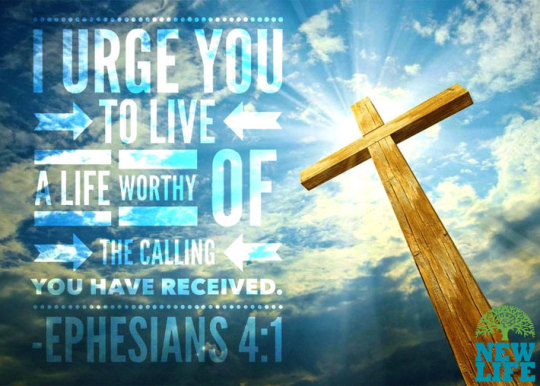
October 21, 2023 – Exhortation
In this season the Holy Spirit is targeting areas of constriction and restriction, limitations and afflictions that have been on the Church -- yokes that you have accepted as normal. All man-made yokes, agreements, and alignments are being severed because God wants you free. To walk in the fullness of your anointing you need to be un-yoked so you are available to minister to others in the freedom Jesus has promised. Like Elisha, you are in a "burning of yokes and oxen" (1 Kings 19:21) season because there is a new assignment concerning your Christ calling on its way.
This is your moment to dig your heels in and join the radical remnant that doesn't live by what they see, hear in the news, or feel, but who are moved by the Spirit of God alone – in Jesus' name!
You will overcome by the BLOOD of the Lamb and the WORD of His testimony. Take communion -- worship, praise, bless those who persecute you.
God is smashing, in pieces, every assignment that has been warring against you and every word pitted against you.
(Isaiah 54:15-17)
Right now believe for a fresh baptism of fire as your boldness and courage to roar in the face of the storm is restored.
ALBERT FINCH MINISTRY
11 notes
·
View notes
Text

Elijah Flees to Horeb
1 And Ahab told Jezebel all that Elijah had done, and withal how he had slain all the prophets with the sword. 2 Then Jezebel sent a messenger unto Elijah, saying, So let the gods do to me, and more also, if I make not thy life as the life of one of them by to morrow about this time. 3 And when he saw that, he arose, and went for his life, and came to Beer-sheba, which belongeth to Judah, and left his servant there.
4 But he himself went a day’s journey into the wilderness, and came and sat down under a juniper tree: and he requested for himself that he might die; and said, It is enough; now, O Lord, take away my life; for I am not better than my fathers. 5 And as he lay and slept under a juniper tree, behold, then an angel touched him, and said unto him, Arise and eat. 6 And he looked, and, behold, there was a cake baken on the coals, and a cruse of water at his head. And he did eat and drink, and laid him down again. 7 And the angel of the Lord came again the second time, and touched him, and said, Arise and eat; because the journey is too great for thee. 8 And he arose, and did eat and drink, and went in the strength of that meat forty days and forty nights unto Horeb the mount of God.
9 And he came thither unto a cave, and lodged there; and, behold, the word of the Lord came to him, and he said unto him, What doest thou here, Elijah? 10 And he said, I have been very jealous for the Lord God of hosts: for the children of Israel have forsaken thy covenant, thrown down thine altars, and slain thy prophets with the sword; and I, even I only, am left; and they seek my life, to take it away. 11 And he said, Go forth, and stand upon the mount before the Lord. And, behold, the Lord passed by, and a great and strong wind rent the mountains, and brake in pieces the rocks before the Lord; but the Lord was not in the wind: and after the wind an earthquake; but the Lord was not in the earthquake: 12 and after the earthquake a fire; but the Lord was not in the fire: and after the fire a still small voice. 13 And it was so, when Elijah heard it, that he wrapped his face in his mantle, and went out, and stood in the entering in of the cave. And, behold, there came a voice unto him, and said, What doest thou here, Elijah? 14 And he said, I have been very jealous for the Lord God of hosts: because the children of Israel have forsaken thy covenant, thrown down thine altars, and slain thy prophets with the sword; and I, even I only, am left; and they seek my life, to take it away. 15 And the Lord said unto him, Go, return on thy way to the wilderness of Damascus: and when thou comest, anoint Hazael to be king over Syria: 16 and Jehu the son of Nimshi shalt thou anoint to be king over Israel: and Elisha the son of Shaphat of Abel-meholah shalt thou anoint to be prophet in thy room. 17 And it shall come to pass, that him that escapeth the sword of Hazael shall Jehu slay: and him that escapeth from the sword of Jehu shall Elisha slay. 18 Yet I have left me seven thousand in Israel, all the knees which have not bowed unto Baal, and every mouth which hath not kissed him.
19 So he departed thence, and found Elisha the son of Shaphat, who was plowing with twelve yoke of oxen before him, and he with the twelfth: and Elijah passed by him, and cast his mantle upon him. 20 And he left the oxen, and ran after Elijah, and said, Let me, I pray thee, kiss my father and my mother, and then I will follow thee. And he said unto him, Go back again: for what have I done to thee? 21 And he returned back from him, and took a yoke of oxen, and slew them, and boiled their flesh with the instruments of the oxen, and gave unto the people, and they did eat. Then he arose, and went after Elijah, and ministered unto him.
— 1 Kings 19 | Authorized King James Version (AKJV)
The Holy Bible: Authorized King James Version; Cambridge University Press, the Crown’s patentee in the UK. All rights reserved.
Cross References: Hebrews 11:34; Hebrews 11:37-38; 1 Kings 18:22; 1 Kings 18:30; 1 Kings 18:40; 2 Kings 2:8; 2 Kings 8:8; 2 Kings 8:12-13; 2 Kings 9:2; Ruth 1:17; 1 Samuel 6:14; 1 Samuel 11:5; 1 Samuel 18:19; 1 Samuel 28:14; 2 Samuel 3:9; 2 Samuel 24:22 Genesis 16:8; Genesis 21:14; Genesis 21:31; Genesis 28:12; Numbers 11:15; Job 4:6; Job 6:9; Zechariah 4:1; Zechariah 4:6; Matthew 4:2; Matthew 26:7; Luke 4:2; Exodus 3:1; Exodus 3:6; Exodus 19:20; Exodus 20:5; Exodus 24:12; Romans 11:3-4; Judges 7:22; Daniel 3:18; Hosea 13:2; Luke 9:61-62; Acts 20:37
#Ahab#Jezebel threatens Elijah#Elijah flees#wilderness#God#encouragement#1 Kings 19#Book of First Kings#Old Testament#AKJV#Authorized King James Bible#Cambridge University Press
3 notes
·
View notes
Text
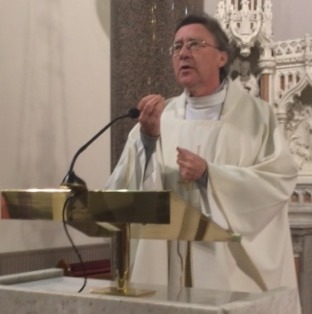
4th September >> Fr. Martin's Gospel Reflections / Homilies on Luke 4:16-30 for Monday, Twenty Second Week in Ordinary Time: ‘No prophet is ever accepted in his own country’.
Monday, Twenty Second Week in Ordinary Time
Gospel (Except USA)
Luke 4:16-30
'This text is being fulfilled today, even as you listen'.
Jesus came to Nazara, where he had been brought up, and went into the synagogue on the sabbath day as he usually did. He stood up to read and they handed him the scroll of the prophet Isaiah. Unrolling the scroll he found the place where it is written:
The spirit of the Lord has been given to me,
for he has anointed me.
He has sent me to bring the good news to the poor,
to proclaim liberty to captives
and to the blind new sight,
to set the downtrodden free,
to proclaim the Lord’s year of favour.
He then rolled up the scroll, gave it back to the assistant and sat down. And all eyes in the synagogue were fixed on him. Then he began to speak to them, ‘This text is being fulfilled today even as you listen.’ And he won the approval of all, and they were astonished by the gracious words that came from his lips. They said, ‘This is Joseph’s son, surely?’
But he replied, ‘No doubt you will quote me the saying, “Physician, heal yourself” and tell me, “We have heard all that happened in Capernaum, do the same here in your own countryside.”’
And he went on, ‘I tell you solemnly, no prophet is ever accepted in his own country.
‘There were many widows in Israel, I can assure you, in Elijah’s day, when heaven remained shut for three years and six months and a great famine raged throughout the land, but Elijah was not sent to any one of these: he was sent to a widow at Zarephath, a Sidonian town. And in the prophet Elisha’s time there were many lepers in Israel, but none of these was cured, except the Syrian, Naaman.’
When they heard this everyone in the synagogue was enraged. They sprang to their feet and hustled him out of the town; and they took him up to the brow of the hill their town was built on, intending to throw him down the cliff, but he slipped through the crowd and walked away.
Gospel (USA)
Luke 4:16-30
He has sent me to bring glad tidings to the poor. No prophet is accepted in his own native place.
Jesus came to Nazareth, where he had grown up, and went according to his custom into the synagogue on the sabbath day. He stood up to read and was handed a scroll of the prophet Isaiah. He unrolled the scroll and found the passage where it was written:
The Spirit of the Lord is upon me,
because he has anointed me
to bring glad tidings to the poor.
He has sent me to proclaim liberty to captives
and recovery of sight to the blind,
to let the oppressed go free,
and to proclaim a year acceptable to the Lord.
Rolling up the scroll, he handed it back to the attendant and sat down, and the eyes of all in the synagogue looked intently at him. He said to them, “Today this Scripture passage is fulfilled in your hearing.” And all spoke highly of him and were amazed at the gracious words that came from his mouth. They also asked, “Is this not the son of Joseph?” He said to them, “Surely you will quote me this proverb, ‘Physician, cure yourself,’ and say, ‘Do here in your native place the things that we heard were done in Capernaum.’” And he said, “Amen, I say to you, no prophet is accepted in his own native place. Indeed, I tell you, there were many widows in Israel in the days of Elijah when the sky was closed for three and a half years and a severe famine spread over the entire land. It was to none of these that Elijah was sent, but only to a widow in Zarephath in the land of Sidon. Again, there were many lepers in Israel during the time of Elisha the prophet; yet not one of them was cleansed, but only Naaman the Syrian.” When the people in the synagogue heard this, they were all filled with fury. They rose up, drove him out of the town, and led him to the brow of the hill on which their town had been built, to hurl him down headlong. But he passed through the midst of them and went away.
Reflections (7)
(i) Monday, Twenty Second Week in Ordinary Time
When Jesus announced in Nazareth that he had come to fulfil the mission of Isaiah to bring good news to the poor and proclaim liberty to captives, the people of his home town greatly approved of what he said and were astonished by his gracious words. However, when he went on to identify with two other prophets, Elijah and Elisha, who had ministered to people beyond Israel, in Sidon and in Syria, they were enraged and tried to do away with him. Jesus understood the poor, the captive, the blind and the downtrodden in the broadest possible sense, as from all the nations and not just from Israel. Jesus was revealing the God of Israel to be the God of all humanity, including even the traditional enemies of Israel. It seems the people of Nazareth resisted this vision of a God whose favour embraced all humanity. Jesus was showing that God has no particular favourites, because his favour rests on all, regardless of who they are or where they are from. This is the insight into God that Jesus gives us. The heart of God is very expansive; it has room for all. Jesus wanted the people of Nazareth, and he wants all of us, to have something of this welcoming heart of God that excludes no one. We can exclude ourselves from God’s loving embrace by rejecting God, as the people of Nazareth rejected Jesus. Yet, even when we do that, God continues to call out to us and draw us to himself
And/Or
(ii) Monday, Twenty Second Week in Ordinary Time
The gospel reading today shows Jesus being rejected by those who initially accepted him. When he went to his home town of Nazareth and preached there, Luke tells us that ‘he won the approval of all’ and people ‘were astonished by the gracious words that came from his lips’. Within a relatively short space of time, that acceptance changed, first to scepticism, ‘This is Joseph’s son, surely?’, and, finally, to outright and murderous rejection, ‘they took him up to the brow of the hill their town was built on, intending to throw him down the cliff’.The gospel reading tells us that, in response to his rejection in Nazareth, Jesus simply ‘slipped through the crowd and walked away’. This is Luke’s way of saying that Jesus continued on with his mission of proclaiming the good news of God’s favour to all people, including those who had rejected him.Jesus was not held back, much less embittered, by the experience of rejection because he was rooted and grounded in God’s love.At his baptism he had heard the words, ‘You are my Son, the Beloved; my favour rests on you’. Our own lives too are rooted in that same faithful love of God; what God said to Jesus he says to all of us.The conviction that God’s love for us is faithful and enduring can keep us strong and free of bitterness in those times when we too might experience misunderstanding or rejection because of our beliefs.
And/Or
(iii) Monday, Twenty Second Week in Ordinary Time
There is a very striking change of mood among the people of Nazareth as they listen to Jesus speak in their synagogue. Initially we are told that ‘they were astonished by the gracious words that came from his lips’. However, by the time Jesus had finished speaking ‘everyone in the synagogue was enraged’, so much so that they hustled Jesus out of the town with a view to throwing him down from the brow of the hill Nazareth was built on. Jesus initially declared that he had come to proclaim good news, especially to the poor, the broken and needy. The people of Nazareth were delighted with this good news, but by the time Jesus had finished speaking his good news had become bad news in their ears. The reason for this was because Jesus went on to announce that his mission of good news was not just to the people of Israel but to the pagans as well, just as the prophets Elijah and Elisha ministered to people outside of Israel. Jesus challenged his townspeople’s narrow, nationalistic, view of God, and they did not like it. Jesus always challenges our view of God. There is always more to God than we imagine; it is only by constantly reflecting on the words and deeds of Jesus that we even begin to know God. It is only in the next life that we will know God as fully as God now knows us.
And/Or
(iv) Monday, Twenty Second Week in Ordinary Time
This morning we begin reading from the gospel of Luke, and in this morning’s gospel reading Luke gives us his account of the beginning of Jesus’ public ministry. According to Luke the first words Jesus spoke in his public ministry were the words of the prophet Isaiah. In the synagogue of his home town, Jesus read a passage from the book of Isaiah. The passage Jesus chose said a great deal about how Jesus understood his ministry. He was sent to bring good news to the poor, the captive, the blind, the downtrodden. The focus of his ministry would be those who were in greatest need, both materially and spiritually. Just went on then to identify himself with two other prophets, Elijah and Elisha, who ministered to the needy outside of Israel. Jesus would minister to those in greatest need, regardless of where they were from; the people of Israel, not even the people of Nazareth, would have no special claim on him. The risen Lord continues to minister to us in our need today. In various ways we can all find ourselves poor, captive, blind, downtrodden. The Lord remains good news for us when we find life a struggle for whatever reason. He walks with us, as he walked with the two disciples on the road to Emmaus, to enrich us in our poverty, to free us in our captivity, to enlighten us in our blindness. Whereas the people of Nazareth rejected him, we are called to keep on welcoming him, and to walk with him as he walks with us.
And/Or
(v) Monday, Twenty Second Week in Ordinary Time
This morning’s gospel reading begins with an account of the liturgy of the word in the synagogue of Jesus’ home town in Nazareth. Jesus stands up to read from the prophet Isaiah and then sits down to comment on what he read. Jesus indentifies himself with the prophet who was sent to bring good news to the poor, to proclaim liberty to captives, new sight to the blind, to set the downtrodden free. Jesus goes on to identify himself with two other prophets, Elijah and Elisha, who ministered to people outside Israel, a hungry widow from Sidon and a leper from Syria. Jesus was saying to the people of Nazareth that he had come for those in greatest need, regardless of who they were or where they were from. This generous vision Jesus had of his mission made the people of Nazareth very angry. Jesus was one of their own and they expected special treatment. However, the good news is that Jesus has come for us all. If he has favourites it is those who are broken in body, in mind, in spirit. The Lord is constantly reaching out to us in our brokenness, in our pain and suffering. All he asks is that we receive him as he is, on his own terms, which the people of Nazareth could not do. The Lord is always close to all of us; it is our need, our suffering, whatever form it takes, which can bring us close to him.
And/Or
(vi) Monday, Twenty Second Week in Ordinary Time
In this morning’s gospel reading we find Jesus in the synagogue of Nazareth announcing what his ministry was going to be about. In a word, he wanted to proclaim the Lord’s year of favour. Jesus would reveal God’s favour for all, especially for those who were usually out of favour, the poor, the captives, the blind and disabled, the downtrodden. We could add to that list, the lost, sinners, widows, all who found themselves on the margins at that time for one reason or another. Jesus was announcing that he was about to reveal the hospitality of God, a hospitality that was as broad as God’s love. This was indeed good news. Yet, strangely, this good news was not well received by the people of his home town. By the end of the gospel reading, they are ready to throw him down the brow of a hill. The final straw seems to have been when Jesus suggested that he would be revealing God’s favour not just to the people of Israel but to pagans as well, just as the prophets Elijah and Elisha had done before him. It seems as if Jesus’ God was just too big for the people of Nazareth, too hospitable, too welcoming, too forgiving, too all embracing, too generous. The gospels will often challenge our image of God. They will break open any narrowness in our vision of God. Yet because the gospels, especially the gospel of Luke, proclaims the favour and hospitality of God, they have the power to transform us, to enrich us in our poverty, to bring us freedom where we were captive, to enlighten our blindness, to give us a sense of belonging to the Lord after we have been lost.
And/Or
(vii) Monday, Twenty Second Week in Ordinary Time
Anger is a normal human emotion. In itself it is neither good nor bad. What matters is how we express it. We are all aware that anger is an emotion that needs to be managed. We can find ourselves doing things or saying things in anger that we subsequently come to regret. Anger has the potential to be quite damaging and destructive. We find a good example of that destructive power of anger in this morning’s gospel reading. The words that Jesus spoke in the synagogue of his home town Nazareth triggered strong anger in those who were listening to him, ‘When they heard this, everyone in the synagogue was enraged’. They gave expression to their anger by taking Jesus to the brow of the hill that Nazareth was built on, intending to throw him down the cliff to his death. This is anger at its most destructive. On this occasion, Luke tells us, Jesus was preserved from their deadly intentions. It is strange that the people of Nazareth should react to Jesus in such a deadly way because what Jesus had to say to them was actually good news. He declared that he was God’s anointed one, sent by God to bring the good news of God’s favour, God’s hospitable love, to everyone, especially to those most in need of it, whether they lived in Israel or outside of it. It seems that the people of Nazareth were not comfortable with such a generous God who favoured the most vulnerable, no matter who they were. The gospel reading invites us to ask the question, ‘How do we hear the message of Jesus?’ Is it good news for us today?’ ‘Do I experience it as good news in my own personal life?’
Fr. Martin Hogan.
2 notes
·
View notes
Text
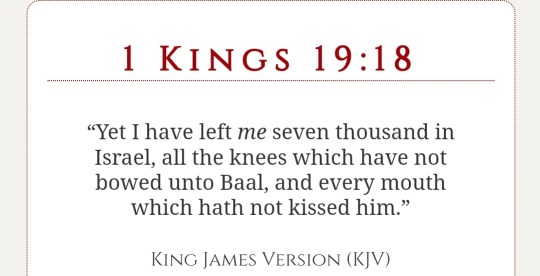
1 Kings 19:18 context
13 And it was so, when Elijah heard it, that he wrapped his face in his mantle, and went out, and stood in the entering in of the cave. And, behold, there came a voice unto him, and said, What doest thou here, Elijah?
14 And he said, I have been very jealous for the LORD God of hosts: because the children of Israel have forsaken thy covenant, thrown down thine altars, and slain thy prophets with the sword; and I, even I only, am left; and they seek my life, to take it away.
15 And the LORD said unto him, Go, return on thy way to the wilderness of Damascus: and when thou comest, anoint Hazael to be king over Syria:
16 And Jehu the son of Nimshi shalt thou anoint to be king over Israel: and Elisha the son of Shaphat of Abelmeholah shalt thou anoint to be prophet in thy room.
17 And it shall come to pass, that him that escapeth the sword of Hazael shall Jehu slay: and him that escapeth from the sword of Jehu shall Elisha slay.
18 Yet I have left me seven thousand in Israel, all the knees which have not bowed unto Baal, and every mouth which hath not kissed him.
19 So he departed thence, and found Elisha the son of Shaphat, who was plowing with twelve yoke of oxen before him, and he with the twelfth: and Elijah passed by him, and cast his mantle upon him.
5 notes
·
View notes
Text
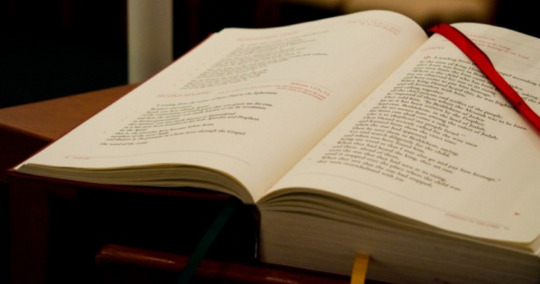
4th September >> Mass Readings (USA)
Monday, Twenty Second Week in Ordinary Time
(Liturgical Colour: Green: A (1))
First Reading
1 Thessalonians 4:13-18
God, through Jesus, will bring with him those who have fallen asleep.
We do not want you to be unaware, brothers and sisters, about those who have fallen asleep, so that you may not grieve like the rest, who have no hope. For if we believe that Jesus died and rose, so too will God, through Jesus, bring with him those who have fallen asleep. Indeed, we tell you this, on the word of the Lord, that we who are alive, who are left until the coming of the Lord, will surely not precede those who have fallen asleep. For the Lord himself, with a word of command, with the voice of an archangel and with the trumpet of God, will come down from heaven, and the dead in Christ will rise first. Then we who are alive, who are left, will be caught up together with them in the clouds to meet the Lord in the air. Thus we shall always be with the Lord. Therefore, console one another with these words.
The Word of the Lord
R/ Thanks be to God.
Responsorial Psalm
Psalm 96:1 and 3, 4-5, 11-12, 13
R/ The Lord comes to judge the earth.
Sing to the LORD a new song;
sing to the LORD, all you lands.
Tell his glory among the nations;
among all peoples, his wondrous deeds.
R/ The Lord comes to judge the earth.
For great is the LORD and highly to be praised;
awesome is he, beyond all gods.
For all the gods of the nations are things of nought,
but the LORD made the heavens.
R/ The Lord comes to judge the earth.
Let the heavens be glad and the earth rejoice;
let the sea and what fills it resound;
let the plains be joyful and all that is in them!
Then shall all the trees of the forest exult.
R/ The Lord comes to judge the earth.
Before the LORD, for he comes;
for he comes to rule the earth.
He shall rule the world with justice
and the peoples with his constancy.
R/ The Lord comes to judge the earth.
Gospel Acclamation
cf. Luke 4:18
Alleluia, alleluia.
The Spirit of the Lord is upon me;
he has sent me to bring glad tidings to the poor.
Alleluia, alleluia.
Gospel
Luke 4:16-30
He has sent me to bring glad tidings to the poor. No prophet is accepted in his own native place.
Jesus came to Nazareth, where he had grown up, and went according to his custom into the synagogue on the sabbath day. He stood up to read and was handed a scroll of the prophet Isaiah. He unrolled the scroll and found the passage where it was written:
The Spirit of the Lord is upon me,
because he has anointed me
to bring glad tidings to the poor.
He has sent me to proclaim liberty to captives
and recovery of sight to the blind,
to let the oppressed go free,
and to proclaim a year acceptable to the Lord.
Rolling up the scroll, he handed it back to the attendant and sat down, and the eyes of all in the synagogue looked intently at him. He said to them, “Today this Scripture passage is fulfilled in your hearing.” And all spoke highly of him and were amazed at the gracious words that came from his mouth. They also asked, “Is this not the son of Joseph?” He said to them, “Surely you will quote me this proverb, ‘Physician, cure yourself,’ and say, ‘Do here in your native place the things that we heard were done in Capernaum.’” And he said, “Amen, I say to you, no prophet is accepted in his own native place. Indeed, I tell you, there were many widows in Israel in the days of Elijah when the sky was closed for three and a half years and a severe famine spread over the entire land. It was to none of these that Elijah was sent, but only to a widow in Zarephath in the land of Sidon. Again, there were many lepers in Israel during the time of Elisha the prophet; yet not one of them was cleansed, but only Naaman the Syrian.” When the people in the synagogue heard this, they were all filled with fury. They rose up, drove him out of the town, and led him to the brow of the hill on which their town had been built, to hurl him down headlong. But he passed through the midst of them and went away.
The Gospel of the Lord
R/ Praise to you, Lord Jesus Christ.
1 note
·
View note
Text
*🌍 PUT AWAY BITTERNESS & MALICE 🌍*
📖 *_"Let all bitterness, and wrath, and anger, and clamour, and evil speaking, be put away from you, with all malice. And be ye kind one to another, tenderhearted, forgiving one another, even as God for Christ's sake hath forgiven you" (Ephesians 4:31-32)._*
Bitterness and malice are offshoots of unforgiving character. There're folks who say, *"I will never forgive so-and-so for what he did to me."* Others merely add a twist to it and say, *"I have forgiven him for what he did to me, but I don't think I can ever forget it."* As a child of God, you should act like your heavenly Father, who never recalls offences. Malice and bitterness will take the shine out of your life. If you want the beauty of God to be seen in your life, then refuse to keep malice or be bitter.
I love the counsel given by the Spirit of God through the Apostle Paul in 1 Corinthians 14:20, he said, *_"Brethren, be not children in understanding: howbeit in malice be ye children, but in understanding be men."_* Babies don't know how to be bitter or keep malice. They're too innocent for that; they don't have enough sense to regard or recognize any wrong done to them. That's what the Spirit of God is telling you here; be as babies! Don't regard the wrong done you by others to the extent that you become bitter.
One of the most dangerous effects of harbouring bitterness or malice in your heart is that it short-circuits the power of God in your life, making you unable to function with the Spirit. This was what happened to the Prophet Elisha in 2 Kings 3. When the Kings of Israel, Judah, and Edom came to inquire of the Lord from him, he spoke out in anger to the King of Israel: *_"...As the LORD of hosts liveth, before whom I stand, surely, were it not that I regard the presence of Jehoshaphat the king of Judah, I would not look toward thee, nor see thee"_* (2 Kings 3:14). Elisha was so angry and bitter against the King of Israel that he couldn't hear what the Spirit was saying. He then had to call a minstrel (a musician) to play so the anointing could come on him and he could receive from the Spirit (2 Kings 3:15).
Don't open the door for Satan to come into your life through bitterness and malice; put them away completely. If you've held anything against anyone, it's time to sincerely forgive them and show them the love of the Father. *~ Pastor Chris Oyakhilome DSc DD*
*📚 FURTHER STUDY:* Colossians 3:8; Hebrews 12:14-15
*Help Spread God's Word Around the World via Online by Sharing This Post.*✌️❣️❣️
God bless you richly👏
4 notes
·
View notes
Text
Doing a New Thing
God is doing a new thing and If we can get new thing right I believe the Lord will release an Elijah anointing on the current leaders.
We find ourselves at an incredible turning point for the Body of Christ. God is doing a new thing and this new thing is, and must be different from the things of the past. For a number of years prophetic voices have declared, “God is doing a new thing.” While this is a true statement, it’s time to discover God’s new thing, not our new thing.
Continue reading Untitled
View On WordPress
0 notes
Text

MECHANICS OF THE SPIRIT -- a Bill's Bible Basics series
This #BillsBibleBasics 3-part series by #BillKochman can be read at:
https://www.billkochman.com/Articles/mechanics-of-the-spirit-01.html
https://www.billkochman.com/Blog/index.php/mechanics-of-the-spirit-a-bills-bible-basics-series/?feed_id=122898&MECHANICS%20OF%20THE%20SPIRIT%20--%20a%20Bill%27s%20Bible%20Basics%20series
#All_Posts#New_Articles#anointed#anointing#comforter#day_of_pentecost#earthen_vessels#elijah#elisha#holy_ghost#holy_spirit#jesus#john_the_baptist#joshua#mechanics#mechanics_of_the_spirit#moses#prophet#spirit#treasure
0 notes
Text
GOD IS INFINITE
9. “So Naaman went with his horses and chariots and waited at the door of Elisha’s house.
10. But Elisha sent a messenger out to him with this message: “Go and wash yourself seven times in the Jordan River. Then your skin will be restored, and you will be healed of your leprosy.”
11. But Naaman became angry and stalked away. “I thought he would certainly come out to meet me!” he said. “I EXPECTED HIM TO WAVE HIS HAND OVER THE LEPROSY AND CALL ON THE NAME OF THE LORD HIS GOD AND HEAL ME!”
2 Kings 5:9-11 (NLT)
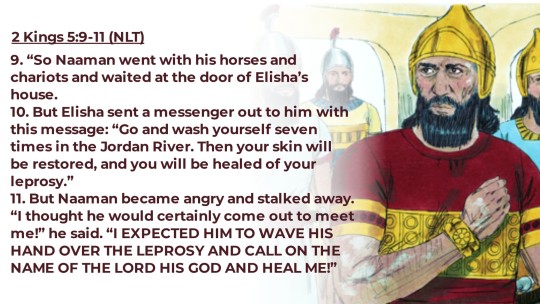
• Naaman was the commander of the army of Syrian, but was leprous.
He was sent to Israel by his Master, the king of Syria, and afterwards to Elisha the PROPHET for healing (2 Kings 5:1-8)
- Meanwhile, Naaman had conceived in his heart how he expected God to move in his matter, even before he got to the prophet—Elisha (2 Kings 5:11).
- When Naaman got to Elisha the prophet, what Elisha told him to do, about receiving his healing, was contrary to what he had in mind.
HE was angry and did not want to obey the instruction given to him by the prophet (2 Kings 5:11,12) .
- God cannot be boxed in, restricted, confined, or be regimented—He is limitless and infinite in His ways.
- The human brain is too small to fathom or reason out the ways of God (Isaiah 55:8,9).
8. “For My thoughts are not your thoughts, Nor are your ways My ways,” says the LORD.
9. “For as the heavens are higher than the earth, SO ARE MY WAYS HIGHER THAN YOUR WAYS, AND MY THOUGHTS THAN YOUR THOUGHTS.”
Isaiah 55:8,9 (NKJV)
- In most cases, when you pray, God may not move the way you have thought or premeditated in your heart—if He did, it would not be a miracle.
• God will move in His own way, not in your own way.
- Naaman had expected Elisha to come out to meet him, wave his hand over the leprosy, and call on the name of the LORD his God, for him to be healed (2 Kings 5:11)
- God might not work, do things, according to your premeditated thoughts.
- Allow God to use the best way: the most suitable or appropriate Way that is pleasing to Him, to solve your problems.
• Do not miss your Blessing or miracle because of pride.
- Humble yourself to do whatever you are instructed to do in His Word or through His anointed servants—for your deliverance to be complete.
- Some people have missed their blessings, miracles, because of pride; they find it difficult to do whatever they are instructed to DO—for the solution to their problems (James 4:10).
“Are not the Abanah and the Pharpar, the rivers of Damascus, better than all the waters of Israel? Could I not wash in them and be clean?” So he turned and went away in a rage.”
2 Kings 5:12 (NKJV)
- For your blessing or miracle to be gotten, you have to obey to the letter, whatever God says.
- God was specific in Naaman’s case, that he should go And wash in the Jordan River for him to get his healing—not just any river.
- Naaman started comparing the rivers in Damascus, his country, with that of Israel, which to him were better than all the rivers in Israel put together.
• Naaman had forgotten or did not understand that it is not the river that will heal his leprosy, but obedience to God’s instruction through His servant (2 Kings 5:10).
- What will solve your problem is obedience to God’s instruction, if you have an option or a way that it should be done apart from that of God, then, you may as well put up with it, but remember you might stay long in the problem or predicament.
• Another thought behind Naaman’s stament and action is: the instruction given to him looked stupid, he thought how could ordinary washing in a river heal his leprosy.
THAT, if it were possible, he should have washed in the rivers of Damascus which are better than the rivers in Israel and the river Jordan which the PROPHET told him to wash in.
- To him, it was ludicrous or absurd to think that washing in a river could heal his leprosy:
“For the message of the cross is foolishness to those who are perishing, but to us who are being saved it is the power of God" (1 Corinthians 1:18).
• Had Naaman refused to heed the counsel of his servants or officers who tried to reason with Him, he could have returned to his country with his problem, LEPROSY, and probably died with it—because there is no medical solution to it, except through the supernatural healing power of God (2 Kings 5:13,14).
13. “And his servants came near and spoke to him, and said, "My father, if the prophet had told you to do something great, would you not have done it? How much more then, when he says to you, 'Wash, and be clean'?"
14. So he went down and dipped seven times in the Jordan, according to the saying of the man of God; AND HIS FLESH WAS RESTORED LIKE THE FLESH OF A LITTLE CHILD, AND HE WAS CLEAN."
2 Kings 5:13,14 (NKJV)
Do not be myopic in your thinking.
- You should know that God works in diverse ways, of various kinds, He has thousands of ways which He could solve any problem or meet any need—with Him all things are possible (Matthew 19:26; Mark 10:27).
“But Jesus looked at them and said, “With men it is impossible, but not with God; FOR WITH GOD ALL THINGS ARE POSSIBLE.”
Mark 10:27 (NKJV)
- Do not conclude in your heart that it is over because someone or some people have disappointed you (Luke 18:27).
- Be flexible in God’s hands and follow His instructions through, for your blessings or miracles to be made manifest (2 Kings 5:14).
- Endeavour to comply with the instructions given to you by God through the written Word; or through the Holy Spirit on the inside of you, or the instructions given through His prophets.
- Do not be another Naaman who almost or nearly missed his blessing or miracle: be open to God’s instructions in His Word, the Bible, and the ones given through His proven ministers.
“But He said, “The things which are impossible with men are possible with God.” ”
Luke 18:27 (NKJV)
• You will not fail in Jesus’s name.
Peace!
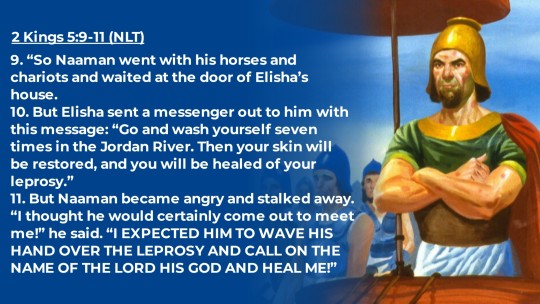
6 notes
·
View notes
Text
FOR OUR LIVES.
He is never too early and too late.
Preacher: Rev John Sigudla
2Kings 6:1-8
Introduction.
The God who do not forget the good that you are doing.
He will remember you very soon.
A. THE BACKGROUND OF THIS WOMAN OF SHUNEM.
He was a very rich woman together with her husband.
she was godly, in so much that she always welcomed the servant of God, Elisha and offered the man of God food and shelter always.
She eventually, consulted her husband that “This man who always passes here, he is truly the man of God.
She then suggested to her husband that something must be done for Elisha the man of God.an upper room must be built for Elijah and not lower room.A bed must be in that upper room, for rest.A table for study must be in that upper room.A chair for setting was supposed too to be in that upper room as he will be reading and studying the Word of God or being studied or read by the Word of God.
The husband of this woman agreed with his wife.
LESSON TO LEARN HERE FROM THIS WOMAN
This woman feared God.
This woman acknowledged servants of God.
This woman was observant.
This woman respected her husband since she followed protocol in whatever she was suggesting.
This woman was barren, she didn’t have children
Though this woman was very wealthy.
This woman was satisfied with her status of childlessness.
This woman never prayed for a child.
Elisha was touched by the kindness of this woman and Elisha wanted to do something for her or her family and the man of God, didn’t know what to do for this family.
The woman was called and sked what she wanted and she said that she was sharp, needed nothing, No prayer for the king to give her more land.
Then Gehazi the servant of Elijah said to Elisha, She doesn’t have children.
Then Elisha responding to his assistance, Call her and when she was there in the presence of Elisha, Elisha said that by next year, that very same time, she will be having a baby boy.
She scolded Elisha by saying “Do not lie to me man of God”
Exactly by next year, the same time, a child was born.
The child became sick later on, and he died, in the field where his Father was working.
The Father said to their servant, “Please take this dead boy to his mother”
Upon arrival, the boy was taken to Elisha’s room and prayer followed and the child was restored back to life.
B. THE FAMINE THAT WAS ABOUT TO HIT THAT LAND.
God will never forget the good you have shown to others.
God owes no man anything, thus your labour in the Lord is not in vain.
God remembered this woman of shunammite
Elisha was send to warn and instruct the woman and her family to leave that country and go anywhere for 7 years’ famine.The woman obeyed together with her family.They left their house and field and everything as they left.Questions, were there, but she said “The Lord said I must go”
After seven severe years of hunger, she together with her family went back home, to go and claim her house and filed.
C. GOD IS ALWAYS ON TIME, NEVER LATE OR EARLY.
When the time was fully come, and the famine gone.
God allowed the King to talk about prophet Elisha and his miracles and the servant of Elisha was asked to mention any miracle that was performed by Prophet Elisha.
Elijah performed 16 miracles but Elijah requested for a double portion of the anointing of Elijah.
Out of so many miracles that were performed by Elisha, Gehazi the servant of Elisha, related a miracle of the son of this woman.
While the King was surprised and listening, this woman came back to claim her property.
Gehazi, when he saw her and the child or son, he said to the king “This is the woman I was talking about and her boy”
The king attention went to this woman and she was asked about what really happened.
She was able to affirm that a miracle indeed took place and that was there not to talk about the miracle, but looking for a miracle of restoration and restitution which means, to be given back that which is hers, compensation, pay back that which belongs to that person.
D. CONCLUSION
GOD IS TRULY FA...
View On WordPress
0 notes
Video
youtube
Why did Christ Jesus walk on water but not the once-born Peter? Of the 1... Why did Christ Jesus walk on water but not the once-born Peter? Of the 12, Peter was Hylic, Juda Iscariot Psychic in Mammon, and the rest Pneumatic sealed to serve God only. https://youtu.be/2cW8c1hnXwY Full description:- http://www.gnosticgospel.co.uk/JesusWater.htm Holy Gospel of our SUPERNATURAL FATHER of our supernatural “souls” Elohim, Allah, ParBrahm, etc., delivered by the first Anointed Christ, which in my native language Punjabi, we call Satguru Jesus of the highest living God Elohim, Allah, Parbrahm, etc. that dwells within His most beautiful living Temple of God created by the greatest artist demiurge Potter, the lord of the visible Nature Yahweh, Brahma, Khudah, etc. and it is called Harmandir or “Emmanuel” if you are not “greedy” according to Christ Rajinder:- WHY JESUS WALKED ON WATER WHILST ONCE-BORN PETER SANK? We have two fathers; natural of flesh, the creator of Pots Yahweh, Brahma, Khudah, etc. called Demiurge for creating the lifeless physical body, and Supernatural of our supernatural “souls”, the invisible supernatural that puts life into the Pots created by Yahweh. So, our visible flesh is related to the Potter Yahweh and the invisible “soul” to our Supernatural Father Elohim, Allah, Parbrahm, etc. Yahweh created the whole world out of the water and Mary was sired by “Yahweh” to give birth to the “Son” of Yahweh called Yahshua; made up of two words; Yah = Yahweh and Weh = sired of Him and Shua = Shiva, the First Primordial Adam. So, Jesus was the Second Adam, Mary his Surrogate Mother, and Joseph of the Judah tribe his Foster father. Thus, Jesus being the Second Adam, had no secular rights on this planet earth of the First Adam. So, he came Floating leaving no mark on this Planet earth. That is why He Said, “Foxes have holes to rest their heads, but the Son of Man has none”. So, all the natural once-born people were created by Yahweh of different colours and races. As the planet Earth belongs to the tribal people, so Moses gave them the law and promoted “Eros”, the love of your own people that lifted the “Rift” among them called the “Lifting of the snake”. So, Moses gave them the “Law” and gave it to a Priestly tribe of “Levi” from whom the Cohens were chosen. Such Cohens kept law and order that created the kingdom of heaven and people lived “Peacefully” through “Works”, and Karma, which earned them reincarnation into the next birth. The crook Rabbis who cheated people in the name of God got leprosy in the next birth which the Prophets cannot forgive but Christ Jesus only. That is why Prophet Elisha did not cure a Leper from Israel but Nama from Syria only. Thus, in the First Adam, people performed works called “Karma” whilst in the Second Adam, people were introduced to the Royal Kingdom of God for the Sons, Saints, of Elohim, Allah, Parbrahm, etc. Saints are called “Christ” who Preach the Gospel from their own hearts in honour of our Bridegroom Christ Jesus to glorify our Supernatural Father Elohim, Allah, Parbrahm, etc. So, John, the Baptist baptised the Jewish people of age who had realised that by becoming a Jew outwardly, you cannot build your covenant with Abraham and become unfaithful to Abraham and Yahweh, a liar, murderer super fatherless “Saltless” people. Here, Jesus used a word that is not considered civilised and called them fanatic devils to which the Jewish people retorted that we are born of the legitimate parents – John 8v44 - You belong to your fathers, the eleven Patriarchs who wanted to kill Joseph, a truthful person Salt of Abraham and Yahweh, they were devils, and you want to carry out your forefather’s desires. He was a murderer from the beginning, not holding to the truth, for there is no truth in him. When he lies, he speaks his native language, for he is a liar and the father of lies as displayed amply today in the news. So, they behaved well under the Priests of Moses, the Prodigal son Isaac brought back to the Promised Land faithful to Abraham and Yahweh, the Salt of Abraham. with time, Moses’ Priests become greedy and start corrupting the Holy Books, the written Torah or Scriptures to suit their whims – Gen17 on circumcision, the Tribal Mark of Abraham to Isaac and his “seed” only but they were circumcising slaves, Aryans and Negros for the sake of money. They also became the cruel Masters. Then our Supernatural Father Elohim, Allah, Parbrahm, etc. Rest on my website. For the unlisted videos:- www.gnosticgospel.co.uk/Unlisted.htm My ebook by Kindle. ASIN: B01AVLC9WO Private Bitter Gospel Truth videos:- www.gnosticgospel.co.uk/JAntisem.htm www.gnosticgospel.co.uk/JOHN 8V44.htm www.gnosticgospel.co.uk/Rest.htm Any helper to finish my Books:- ONE GOD ONE FAITH:- www.gnosticgospel.co.uk/bookfin.pdf and in Punjabi KAKHH OHLAE LAKHH:- www.gnosticgospel.co.uk/pdbook.pdf Very informative Channel:- Punjab Siyan. John's baptism:- www.gnosticgospel.co.uk/johnsig.pdf Trinity:- www.gnosticgospel.co.uk/trinity.pdf
0 notes
Text

FOLLOWING THE LEADING OF HIS SPIRIT
Ephesians 4:20-24 ” throw off your old sinful nature and your former way of life, which is corrupted by lust and deception.Instead, let the Spirit renew your thoughts and attitudes. Put on your new nature, created to be like God—truly righteous and holy.”
In this season God is charging us to fully put some old things under our feet...to fully put to death the works of the flesh, tradition, and mindsets. We have a choice as to whether we will rise up and get victory over the old things that hinder us.
For an increased anointing, one of the FIRST things we must understand in order to INCREASE we must RELEASE.
Because His desire is for us to increase, He will keep leading us back to the same situations, so that He can deal with heart issues and control issues. Our spiritual advancement requires that we totally yield ourselves to His Spirit and continue affirming and meditating on His Word that has to do with our Christ identity.
We must release old mindsets concerning how WE think His Spirit should move. If a certain flow does not line up with our mindset, we too quickly negate how God desires to minister. Remember, they rejected Jesus because of their religious mindsets, and many missed the hour of His divine visitation.
Elisha went through his "testing four different times." We need to consider four different tests and challenge ourselves to press into the overcoming power within us, so that we also, can step into that increased anointing.
THE FIRST TEST: GILGAL
One of the meanings of the word Gilgal is "circle." Unless we determine to rid ourselves of the works of the flesh, we will circle around this mountain again.
If we do not pass the test at Gilgal, we will circle once more, and God will examine our hearts.
THE SECOND TEST: BETHEL
Bethel means "The House of God."
Each of us "houses" the anointing. We are the temple of the Lord because He lives in us
This is why we can minister wherever we are! Because we are God's temple, we are not limited to any building, setting, or place. We should be ministering under the unction of the Holy Spirit, being divinely led.
THE THIRD TEST: JERICO
Just as Elisha approached his test at Jericho, so will we be tested. Are we waiting to be sent ones, and are we pressing into the fullness of understanding and implementing God’s purpose for our life?
The Lord has a test for each of us...how much do you hunger to advance God’s Kingdom in the earth? Are you completely “SOLD OUT” to Jesus? If so…you may be ready for the anointing.
THE FOURTH PLACE OF TESTING: JORDAN
Jordan means "descending" or "flowing down." The only way the anointing flows (according to Psalm 133), is downward. The anointing of your mentor will flow down upon you if you remain faithful to the end of your testing. Ultimately, we know that Christ is the head. However, when we are submitted to Christ, we are also submitted to those He has placed in authority over us, and we are in UNITY. It is only then, that we are properly positioned for the flow of anointing.
ALBERT FINCH MINISTRY
7 notes
·
View notes
Photo
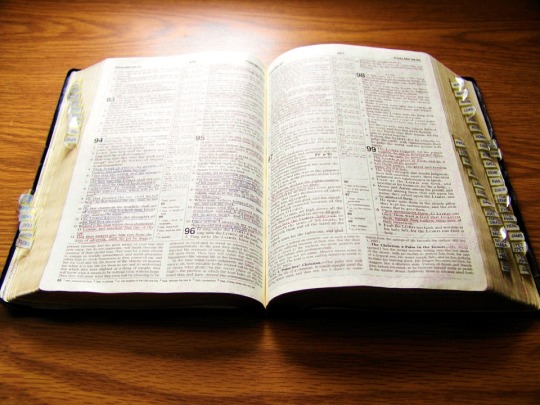
Elijah Flees From Jezebel
1 And Ahab told Jezebel all that Elijah had done, and also how he had slain all the prophets with the sword.
2 Then Jezebel sent a messenger unto Elijah, saying, “So let the gods do to me, and more also, if I make not thy life as the life of one of them by tomorrow about this time.”
3 And when he saw that, he arose and went for his life and came to Beersheba, which belongeth to Judah, and left his servant there.
4 But he himself went a day’s journey into the wilderness, and came and sat down under a juniper tree; and he requested for himself that he might die, and said, “It is enough! Now, O Lord, take away my life, for I am not better than my fathers.”
5 And as he lay and slept under a juniper tree, behold, then an angel touched him and said unto him, “Arise and eat.”
6 And he looked, and behold, there was a cake baked on the coals and a cruse of water at his head. And he ate and drank, and lay down again.
7 And the angel of the Lord came again the second time, and touched him and said, “Arise and eat, because the journey is too great for thee.”
8 And he arose, and ate and drank, and went in the strength of that meat forty days and forty nights unto Horeb the mount of God.
9 And he came thither unto a cave and lodged there; and behold, the word of the Lord came to him, and He said unto him, “What doest thou here, Elijah?”
10 And he said, “I have been very jealous for the Lord God of hosts; for the children of Israel have forsaken Thy covenant, thrown down Thine altars, and slain Thy prophets with the sword. And I, even I only, am left; and they seek my life, to take it away.”
11 And He said, “Go forth, and stand upon the mount before the Lord.” And behold, the Lord passed by, and a great and strong wind rent the mountains and broke in pieces the rocks before the Lord, but the Lord was not in the wind; and after the wind an earthquake, but the Lord was not in the earthquake.
12 And after the earthquake a fire, but the Lord was not in the fire; and after the fire a still small voice.
13 And it was so, when Elijah heard it, that he wrapped his face in his mantle, and went out and stood in the entrance of the cave. And behold, there came a voice unto him and said, “What doest thou here, Elijah?”
14 And he said, “I have been very jealous for the Lord God of hosts, because the children of Israel have forsaken Thy covenant, thrown down Thine altars, and slain Thy prophets with the sword. And I, even I only, am left; and they seek my life, to take it away.”
15 And the Lord said unto him, “Go, return on thy way to the Wilderness of Damascus. And when thou comest, anoint Hazael to be king over Syria;
16 and Jehu the son of Nimshi shalt thou anoint to be king over Israel; and Elisha the son of Shaphat of Abelmeholah shalt thou anoint to be prophet in thy stead.
17 And it shall come to pass that him that escapeth the sword of Hazael shall Jehu slay; and him that escapeth from the sword of Jehu shall Elisha slay.
18 Yet I have left Me seven thousand in Israel, all the knees which have not bowed unto Baal, and every mouth which hath not kissed him.”
19 So he departed from thence, and found Elisha the son of Shaphat, who was plowing with twelve yoke of oxen before him, and he with the twelfth; and Elijah passed by him, and cast his mantle upon him.
20 And he left the oxen and ran after Elijah, and said, “Let me, I pray thee, kiss my father and my mother, and then I will follow thee.” And he said unto him, “Go back again, for what have I done to thee?”
21 And he returned back from him, and took a yoke of oxen and slew them and boiled their flesh with the instruments of the oxen, and gave unto the people, and they ate. Then he arose and went after Elijah, and ministered unto him.
— 1 Kings 19 | 21st Century King James Version (KJV21)
The Holy Bible; 21st Century King James Version Copyright © 1994 by Deuel Enterprises, Inc.
Cross References: Genesis 16:8; Genesis 21:14; Genesis 21:31; Genesis 28:12; Exodus 3:6; Exodus 19:20; Exodus 24:12; Numbers 11:15; Judges 7:22; Ruth 1:17; 1 Samuel 11:5; 1 Samuel 18:19; 1 Samuel 28:14; 2 Samuel 3:9; 2 Samuel 24:22; 1 Kings 18:20; 1 Kings 18:22; 1 Kings 18:30; 2 Kings 2:8; 2 Kings 3:11; 2 Kings 8:8; 2 Kings 8:12-13; 2 Kings 9:2; Job 4:16; Job 6:9; Daniel 3:18; Hosea 13:2; Zechariah 4:1; Zechariah 4:6; Matthew 4:2; Matthew 8:21-22; Matthew 26:7; Luke 4:2; Romans 11:3-4; Hebrews 11:34; Hebrews 11:37-38
#Elijah flees from Jezebel#The LORD speaks to Elijah at Horeb#the calling of Elisha#1 Kings 19#Book of First Kings#Old Testament#KJV21#Holy Bible#21st Century King James Version#Deuel Enterprises Inc.
16 notes
·
View notes